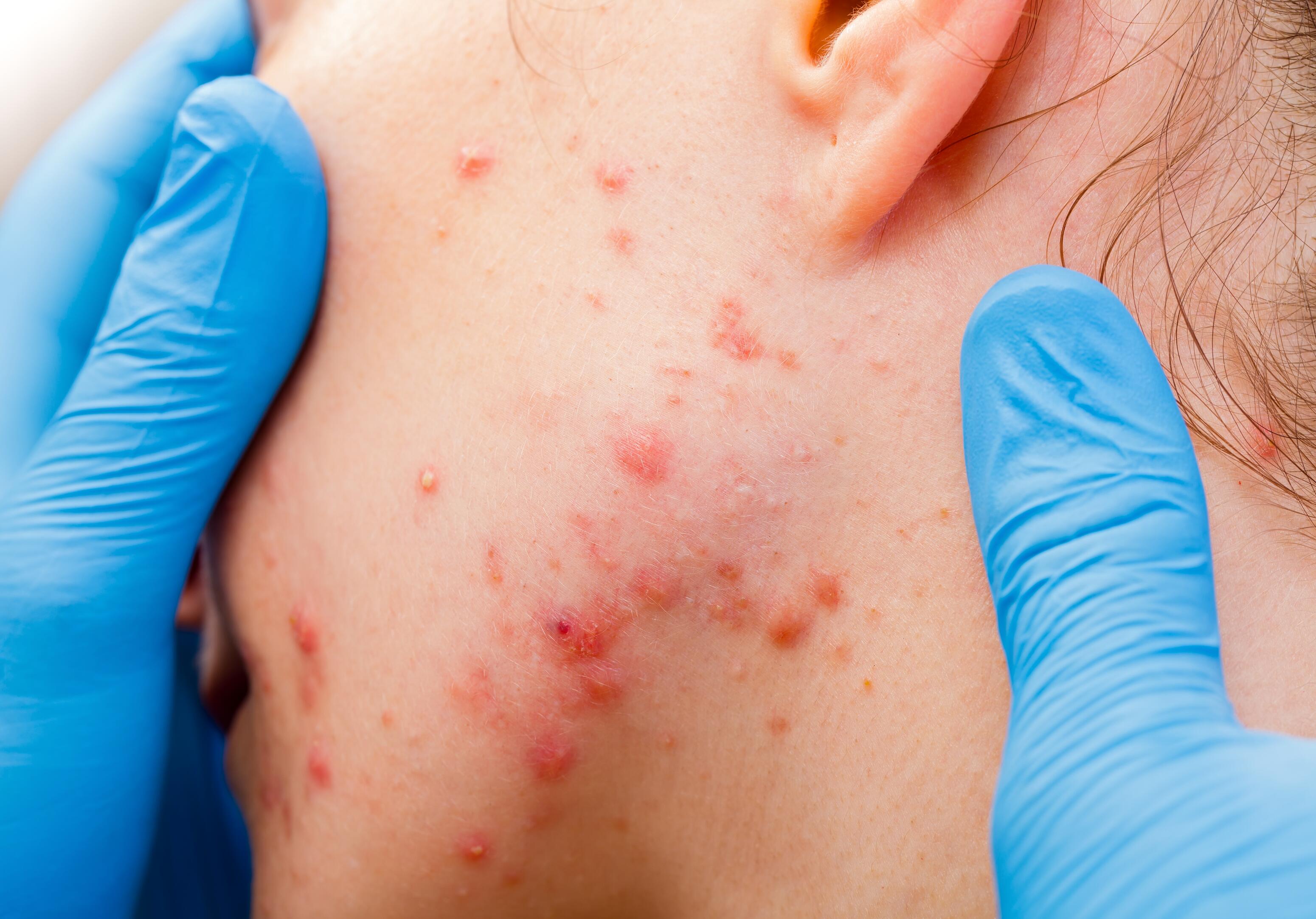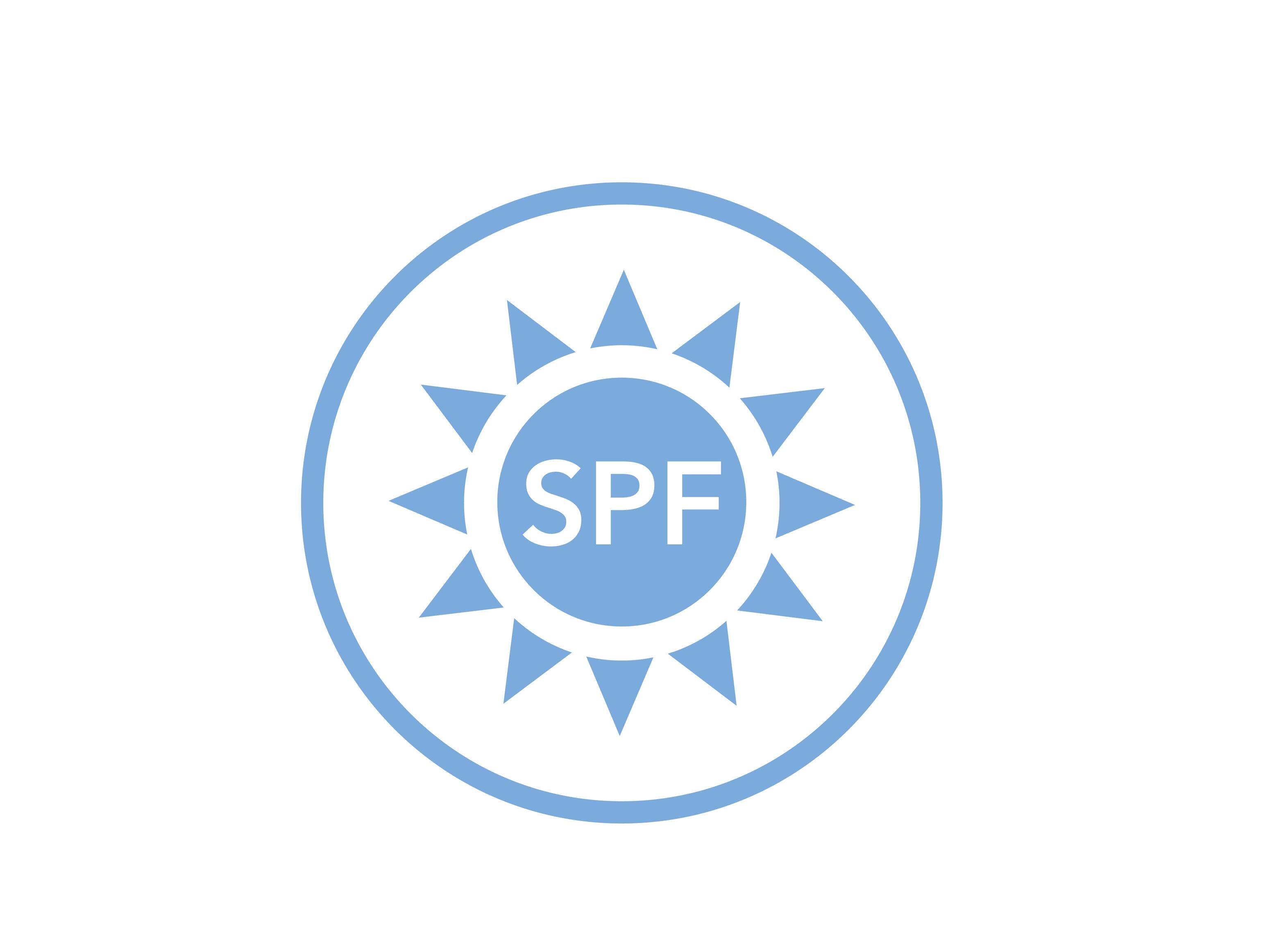Inflammatory Acne: Causes and Treatments

Summary
What is Inflammatory Acne?¹ ²
Inflammatory acne is a form of acne characterised by red, sometimes painful lesions that can leave scars if they are deep or improperly treated. It develops when skin pores (pilosebaceous follicles) become blocked, allowing bacteria such as Cutibacterium acnes to multiply. This triggers the body's immune response, leading to inflammation of the sebaceous glands.
This process results in the appearance of papules (small red bumps), pustules (red bumps with a white head of pus), nodules (painful, deep lumps), and sometimes cysts (encapsulated, persistent lesions). These lesions are more severe than blackheads or whiteheads and can affect deeper layers of the skin, increasing the risk of scarring.
Unlike inflammatory acne, comedonal (non-inflammatory) acne consists of blackheads and whiteheads without redness or pain. It occurs when the pilosebaceous follicles are clogged with excess sebum and dead skin cells without triggering significant inflammation. If left untreated, it can progress into an inflammatory form.

Causes and Contributing Factors of Inflammatory Acne¹ ² ³
Inflammatory acne stems from a complex biological, hormonal, genetic, environmental, and behavioural interaction. These factors can contribute to the onset, worsening, and persistence of acne lesions.
Hormonal Imbalances
Acne is often linked to an increased sensitivity of the sebaceous glands to androgens (such as testosterone), which stimulate excess sebum production. These hormonal fluctuations are particularly prominent during adolescence but can also occur before menstruation, during pregnancy, or in cases of hormone-related disorders (such as polycystic ovary syndrome). For women, these hormonal changes often worsen acne symptoms.

Bacterial Proliferation
Cutibacterium acnes is a naturally occurring skin bacterium that thrives in blocked follicles filled with excess sebum. Its overgrowth leads to inflammation and contributes to the development of characteristic inflammatory lesions of acne.
Genetic Predisposition
Family history plays a significant role in the likelihood and severity of acne. People whose parents had acne are more likely to develop severe forms themselves. This genetic tendency affects sebum production and the possibility of follicular inflammation.
Improper Skincare and Lifestyle Habits
- Inappropriate skincare: Using unsuitable or comedogenic cosmetics can clog pores and trigger breakouts. Failing to remove makeup or wash your face after sweating can worsen acne.
- Poor hygiene: Sleeping with makeup, sharing towels or brushes, or over-washing the face can irritate the skin and aggravate acne.
- Mechanical irritation: Tight clothing, helmets, or headbands, as well as repeated friction in certain areas, can contribute to flare-ups.
- Picking or squeezing spots: This increases inflammation, slows healing, and heightens the risk of scarring.
Don't touch your face
Avoid irritating products
Dry yourself
Diet and Skin Health
While the link between diet and acne remains under discussion, some studies suggest that high-glycaemic foods, dairy products, and specific growth factors may promote sebum production and acne. Chocolate, despite common belief, has not been definitively linked to acne. A healthy lifestyle, including a balanced diet rich in fresh fruit and vegetables, is recommended to help reduce breakouts.

Psychological Stress
Stress increases sebum production by activating chemical messengers in the skin, such as substance P, which raises the risk of inflammatory flare-ups. Stress can also lead to compulsive spot-picking, worsening irritation and scarring.
Medications and Metabolic Disorders
Some medications (such as steroids, lithium, or anticonvulsants) can trigger or worsen acne. Endocrine or metabolic conditions can also disrupt hormone levels, increasing sebum production and acne outbreaks.
Types of Inflammatory Acne Lesions¹ ²
Inflammatory acne presents a range of skin lesions, from superficial inflammations to deep nodular damage.
Papules
Papules are small, firm, red bumps, typically under 5 mm in size. Often surrounded by inflammation, they may be tender and reflect a superficial infection of the sebaceous glands, usually involving Cutibacterium acnes. They can appear spontaneously or develop from existing comedones. If untreated, they may evolve into pustules.
Pustules
Pustules often develop on top of papules and contain yellowish pus. They can rupture on the skin’s surface or worsen into nodules if inflammation spreads deeper.
Nodules
Nodules are large, painful, deep-seated lesions extending into the skin's lower layers (dermis and hypodermis). These firm bumps often exceed 5 mm in size and can last for a prolonged period. They may become abscesses, rupture, or cause significant scarring, sometimes requiring drainage or minor surgery.
Cysts
Also known as pseudocysts, these are deep, encapsulated lesions surrounded by a fibrous membrane that prevents the natural drainage of their contents. Commonly found on the back and typical of nodulocystic acne, they often lead to permanent scarring and require specialised treatment.
Scars
Severe, untreated, or manipulated inflammatory lesions can result in permanent scarring. These scars can be atrophic (depressed) or hypertrophic (raised).
Effective Treatments for Inflammatory Acne¹ ² ⁴
Managing inflammatory acne requires careful assessment of lesion severity, risk of scarring, and the psychosocial impact on quality of life.
Treatment options vary according to the severity:
- Topical treatments (gels, creams): Benzoyl peroxide and retinoids are recommended for mild to moderate forms. However, on their own, they are often insufficient for deep lesions like nodules or cysts.
- Oral treatments:
○ Antibiotics such as doxycycline or lymecycline can be combined with topical treatments for moderate to severe acne.
○ Oral isotretinoin: In cases of high scarring risk or treatment failure, isotretinoin is the gold standard for severe acne but requires close medical supervision due to potential side effects.
These treatments take time: several weeks may be necessary for noticeable improvement. Adherence to the prescribed regimen is key to success and is often the main reason for treatment failure.
If treatment proves ineffective despite proper use, the doctor may modify the regimen, changing medications or combining treatments (e.g., benzoyl peroxide and oral antibiotics). For the most severe or resistant cases, isotretinoin remains the reference treatment.
How to Prevent Inflammatory Acne¹ ³ ⁵
Preventing inflammatory acne involves a combination of proper skincare, healthy lifestyle choices, and environmental precautions to reduce triggering factors.
Skincare and Hygiene
A gentle and consistent skincare routine helps prevent pore blockages and inflammation:
- Wash your face once or twice a day with a mild, non-irritating cleanser, especially after sweating.
- Use suitable, non-comedogenic products without alcohol or harsh ingredients. Avoid scrubs unless recommended by a dermatologist.
- Shampoo regularly, especially if you have oily hair, to prevent forehead and facial breakouts.
Avoid irritating products
Dermatologist
Shampoo regularly
Wash your face once or twice a day
Environmental and Lifestyle Factors
Simple daily habits can make a difference:
- Avoid touching your face—handling spots can spread bacteria and increase the risk of scarring.
- Protect your skin from the sun: UV rays can worsen acne, and specific treatments increase sun sensitivity. Use sun cream formulated for acne-prone skin.
- Manage stress: Techniques like yoga or meditation can help reduce flare-ups.
- Avoid smoking: Tobacco worsens skin quality and may aggravate acne.
Diet and Skin Health
While evidence is mixed, a healthy diet supports better skin health:
- Reduce high-glycaemic foods and dairy if you notice they trigger breakouts.
- Focus on a diet rich in fresh fruit and vegetables to promote clearer skin.
Don't touch your face
Sun protection
Stress
No smoking
Balance diet
The Impact of Inflammatory Acne on Quality of Life² ⁶
The effects of inflammatory acne go beyond the skin, particularly in severe cases. It can impact self-image, social interactions, and mental health. Many individuals experience low self-esteem, anxiety, and even depressive symptoms, which may persist even after visible improvement.
Social withdrawal, fear of judgement, and the stigma of visible lesions all contribute to a general sense of distress. To address these issues, a comprehensive approach combining dermatological treatment and psychological support is often beneficial for restoring confidence and overall well-being.
Sources
1.Jegou-Penouil MH. L’acné. Maladie du follicule pilo-sébacé. Société française de dermatologie. 2019 Dec. [Internet]. https://dermato-info.fr/fr/les-maladies-de-la-peau/l%E2%80%99acn%C3%A9
2.Sutaria AH and al. Acne Vulgaris. Treasure Island (FL): StatPearls Publishing; 2024 Jan. [Internet]. https://www.ncbi.nlm.nih.gov/books/NBK459173/
3.AAD. 10 skin care habits that can worsen acne. American academy of dermatology association. [Internet].
https://www.aad.org/public/diseases/acne/skin-care/habits-stop
4.Haute autorité de santé. Acné : quand et comment la traiter? HAS.fr. 2015 Nov. [Internet]. https://www.has-sante.fr/jcms/c_2574402/fr/acne-quand-et-comment-la-traiter
5.L'assurance maladie. Acné. Que faire et quand consulter. Ameli.fr. 2024 Jun. [Internet]. https://www.ameli.fr/assure/sante/themes/acne/bons-reflexes-bons-gestes
6.Oakley A and al. Psychological effects of acne. DermNet. 2014 Feb. [Internet]. https://dermnetnz.org/topics/psychological-effects-of-acne1.
- Discover Hormonal acne: causes, symptoms and treatments
Hormonal acne: causes, symptoms and treatments
- Discover Retention Acne: A Guide to Effective Care and Solutions
Retention Acne: A Guide to Effective Care and Solutions
- Discover Acne and Rosacea: Symptoms and Effective Treatments
Acne and Rosacea: Symptoms and Effective Treatments
- Discover Severe Acne: Types, Causes, and Suitable Treatments
Severe Acne: Types, Causes, and Suitable Treatments














